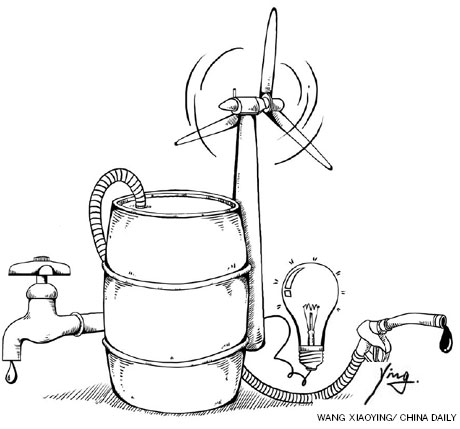Op-Ed Contributors
Debate: Energy
(China Daily)
Updated: 2010-08-23 08:06
 |
Large Medium Small |

Which source of energy should China invest in to meet its demands in the future? Two experts talk about their choices.
We've accepted new energy is vital
By Lin Boqiang
New energy has got unprecedented importance in China. The mid- and long-term development program for renewable energy was issued in 2007. The new energy and industrial development plan is about to be promulgated soon, and should help the new energy and related industries to attract 5 trillion yuan ($736.16 billion) in direct investment in the next 10 years.
New energy is what the country should seek and is seeking. The government now has to carry out the plans for the development of new energy, including policy adjustments, electricity tariff reform and fund distribution, properly and successfully.
In the short term, the new energy industry faces a technical bottleneck. For example, the problem of storing electricity generated by wind power and integrating it with the grids is still in the elementary stage. Therefore, neither wind nor nuclear power is likely to become a potent alternative energy source and be commercialized in the short run. In fact, the wind, solar and nuclear power sectors still need huge investments to become alternatives to the fossil-fuel power industry.
As in other countries, the development of new energy in China is dependent on the government's fiscal support and favorable policies. Besides, the development of the new energy industry in the country faces another obstacle: the relatively low tariff of electricity generated by the traditional sector.
To overcome the obstacles, future plans should focus on at least two major factors.
First, prices of electricity generated by conventional sources must be adjusted to reflect the cost of resources and the environment, so that the new energy industry gets a level playing field to determine its tariff. To raise the competitiveness of new energies, the government can either pour in more funds or adjust the price structure of traditional energy generators. And it should specify these two aspects in the planning to ensure they are implemented properly.
Second, besides favorable policies and investment, the government has to encourage cooperation between researchers in new energy and enterprises to ensure strong technological and manpower support for the industry. For that, future plans need to focus on intellectual property rights protection, encouraging innovation, and guiding more skilled personnel and capital toward the new energy industry. Moreover, the development of new energy needs an energy law to serve as protective guide and favorable policies to attract more investment.
Since it is unnecessary to hold more discussions and debates on the importance of new energy, the government should focus more on promoting it and lowering its generating cost to the minimum. On one hand, for the sound and fast development of the new energy industry, plans and projects should be devised according to resource distribution and market situation. On the other, the government's supportive policies should keep pace with the necessity of new projects. The many wind-power generators revolving idly for lack of grid integration should make us realize that without proper planning and execution it is impossible to prevent wastage of funds and resources.
The government, for now, should focus on research and use of new energy, and leave the manufacturing of equipment to the market. If new energy cannot be properly utilized, then overcapacity could hamper further development and expansion of the industry. And without research and innovation, new energy cannot lead the country toward a more advanced and greener use of energy.
The author is director of the Center for Energy Economic Research of China in Xiamen University.